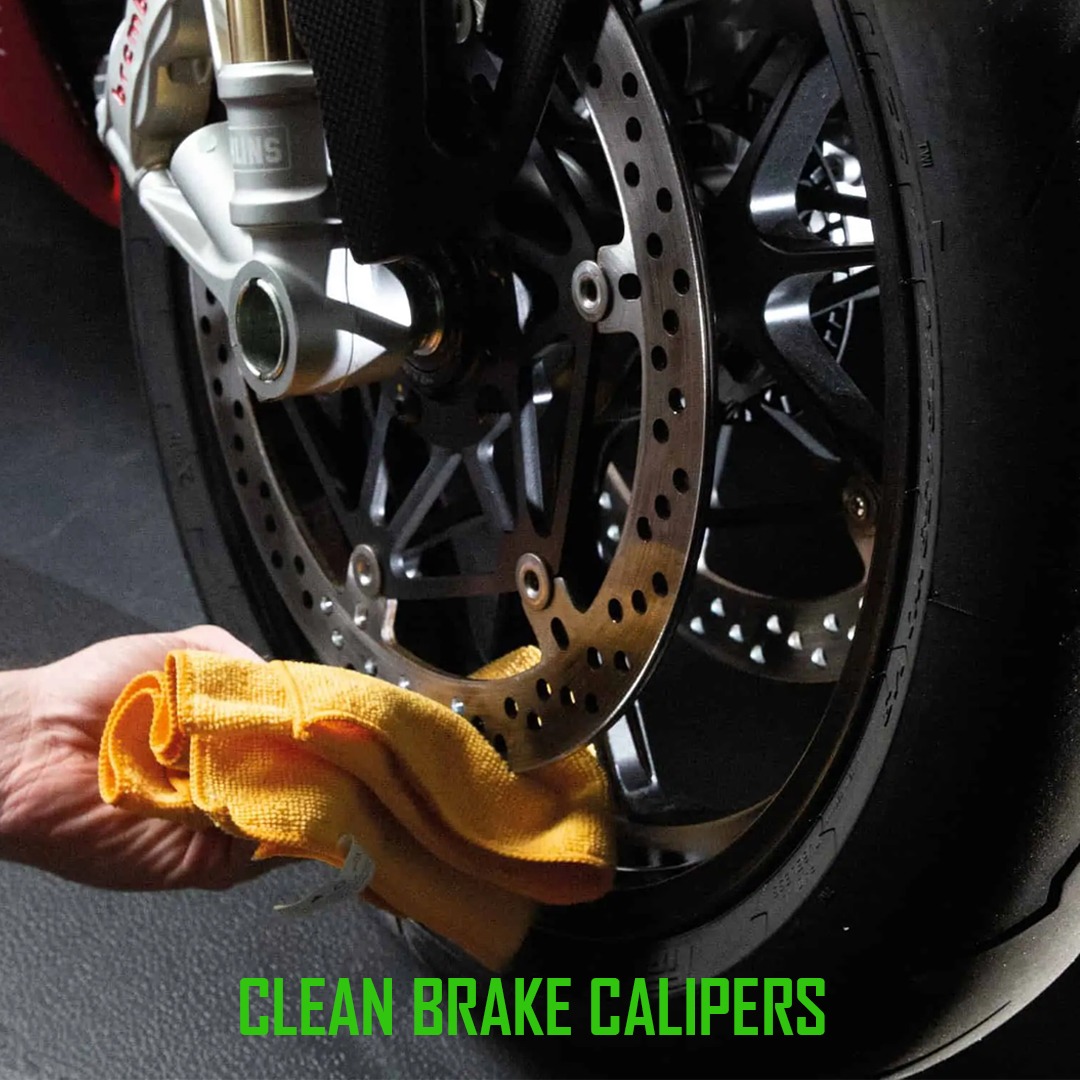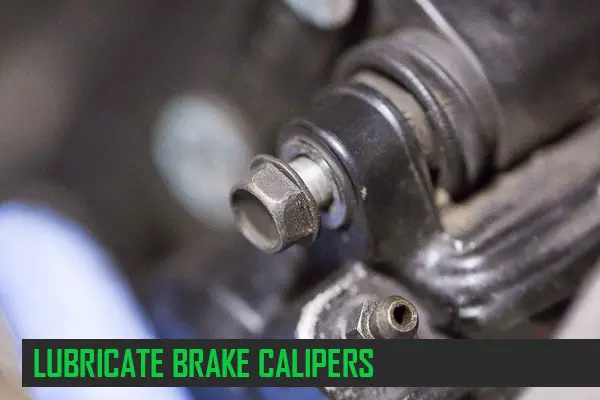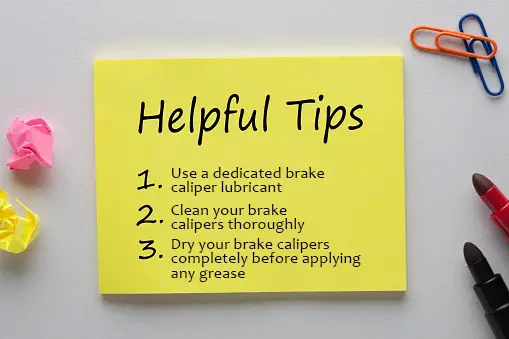10 Steps to Clean and Lubricate Brake Calipers on a Motorcycle
Regarding motorcycles, safety is paramount, and well-maintained brakes are the unsung heroes that ensure every ride is a secure journey. Brake calipers are crucial in stopping power, making them essential to your motorcycle’s performance. Regular cleaning and lubrication of brake calipers are necessary to keep your brakes in top-notch condition.
This comprehensive guide takes you through the steps to effectively clean and lubricate your motorcycle’s brake calipers, ensuring your brakes are always ready to deliver the stopping prowess you need on the road. Let’s dive into the world of DIY motorcycle maintenance and elevate your riding experience to the next level of safety and satisfaction.
How to clean brake calipers on a motorcycle?

Cleaning brake calipers on a motorcycle is a crucial maintenance task that enhances braking performance and prolongs the life of your brake system. Here’s a step-by-step guide on how to effectively clean brake calipers:
Step 1: Gather Necessary Tools and Materials Before you begin, ensure you have the following tools and materials ready:
Certainly! Here’s the information presented in a table format:
| Cleaning brush (soft bristle or toothbrush) |
|---|
| Brake cleaner spray |
| Cleaning brush (soft-bristle or toothbrush) |
| Clean cloth or rags |
| Safety glasses |
| Gloves |
Step 2: Elevate the Motorcycle Prop your motorcycle securely on a stand or lift to allow easy access to the wheels and brake calipers. Make sure the bike is stable to prevent accidents.
Step 3: Remove the Caliper Gently remove the caliper bolts using the appropriate wrenches. Be cautious not to damage any brake lines or components during removal. Depending on the motorcycle, you might need to detach the caliper entirely or partially, allowing you to access the brake pads and caliper.
Step 4: Spray Brake Cleaner Spray brake cleaner generously on the caliper, brake pads, and other components. Brake cleaner helps dissolve brake dust, grime, and debris that accumulate on the calipers over time.
Step 5: Brush and Scrub Use a soft-bristle brush or an old toothbrush to scrub the caliper and brake components. Pay special attention to hard-to-reach areas, crevices, and around the brake pistons. This process will help dislodge stubborn dirt and brake dust.
Step 6: Wipe Clean Wipe down the caliper, brake pads, and surrounding areas with a clean cloth or rag. Ensure that all traces of dirt, grease, and brake cleaner residue are removed. This step prepares the surfaces for lubrication.
Step 7: Check Brake Pads While you have the caliper removed, inspect the condition of the brake pads. Ensure they are within acceptable thickness limits and free from excessive wear or damage. Replace if necessary.
Step 8: Reassemble Carefully reattach the caliper, ensuring proper alignment and torque specifications as per your motorcycle’s manual. Double-check that all bolts and fasteners are securely tightened.
Step 9: Test Brakes After reassembly, pump the brake lever a few times to restore brake pressure. Test the brakes in a safe area at low speeds to ensure they respond properly.
Step 10: Dispose of Waste Properly Dispose of used rags, cloths, and any waste materials in an environmentally responsible manner. Brake cleaners and debris can be hazardous to the environment if not handled correctly.
Regularly cleaning your motorcycle’s brake calipers is essential for maintaining effective braking performance and overall safety. By following these steps, you’ll not only enhance the lifespan of your brakes but also contribute to a more enjoyable and secure riding experience.
How to lubricate brake calipers on a motorcycle?

Lubricating brake calipers on a motorcycle is crucial in maintaining optimal braking performance and ensuring smooth operation. Here’s a step-by-step guide on how to properly lubricate brake calipers:
Step 1: Gather Necessary Tools and Materials Before you begin, gather the following tools and materials:
Here’s the information presented in a table format:
| Tools and Materials |
|---|
| High-temperature brake caliper grease |
| Clean cloth or rags |
| Safety glasses |
| Gloves |
Step 2: Elevate the Motorcycle Just like when cleaning the calipers, elevate your motorcycle securely on a stand or lift to access the wheels and brake calipers easily.
Step 3: Remove the Caliper. Gently remove the caliper bolts using the appropriate wrenches. Be cautious not to damage any brake lines or components during removal. Depending on your motorcycle, you might need to detach the caliper partially or entirely to access the brake pads and caliper.
Step 4: Clean the Caliper Before lubricating, ensure that the caliper and brake components are clean and free from dirt, debris, and brake cleaner residue. You can refer to the steps outlined in the previous cleaning guide.
Step 5: Apply Lubricant Using a high-temperature brake caliper grease or lubricant, apply a thin, even layer to the caliper pins, slide pins, and any other moving parts that come into contact with the brake pads. Avoid getting lubricant on the brake pad material or braking surface.
Step 6: Work the Lubricant In Gently, work the lubricant into the caliper pins and moving parts by sliding them back and forth. This helps distribute the lubricant evenly and ensures smooth movement.
Step 7: Reassemble. Carefully reattach the caliper, making sure it’s aligned properly. Tighten the bolts securely according to your motorcycle’s manual specifications.
Step 8: Test Brakes After reassembly, pump the brake lever a few times to restore brake pressure. Test the brakes in a safe area at low speeds to ensure they respond smoothly and effectively.
Step 9: Clean Excess Lubricant Wipe off any excess lubricant that might have squeezed out during reassembly using a clean cloth or rag. Excess lubricant can attract dirt and debris, affecting brake performance.
Step 10: Dispose of Waste Properly Dispose of used rags, cloths, and any waste materials in an environmentally responsible manner.
Lubricating your motorcycle’s brake calipers ensures that the moving parts operate smoothly and reduces the risk of brake binding or uneven wear. By following these steps, you’ll contribute to maintaining the effectiveness and safety of your motorcycle’s braking system, enhancing your overall riding experience.
Also Read: How to Lubricate Brake Calipers?
What are the benefits of cleaning and lubricating brake calipers?

Cleaning and lubricating brake calipers on a motorcycle offer a range of benefits that contribute to both safety and performance. Here are the key advantages of performing these maintenance tasks:
1. Enhanced Braking Performance: Over time, dirt, debris, and brake dust can accumulate on brake calipers, affecting their movement and responsiveness. Cleaning ensures that the calipers can operate smoothly and engage the brake pads effectively, leading to improved braking performance and shorter stopping distances.
2. Prevention of Brake Binding: Brake binding occurs when the caliper’s moving parts become restricted due to debris or lack of lubrication. Proper lubrication prevents friction-related issues, allowing the calipers to move freely. This prevents uneven pad wear, overheating, and compromised braking efficiency.
3. Increased Caliper Lifespan: Regular cleaning and lubrication help prevent corrosion and rust on the caliper’s components, extending their lifespan. Corrosion can lead to seized caliper parts, which not only affects braking but also requires costly repairs.
4. Reduction of Brake Noise: Brake squealing or squeaking noises are often caused by improper movement of caliper components. Lubricating the appropriate areas reduces friction-induced noise, leading to a quieter and more comfortable ride.
5. Consistent Brake Feel: Clean and properly lubricated calipers ensure consistent and smooth brake engagement. This leads to a more predictable and confident braking feel, particularly in varying road conditions.
6. Minimized Maintenance Costs: Regular maintenance can help detect potential issues early on, preventing more extensive damage that might require costly repairs. Well-maintained brake calipers reduce the likelihood of emergency repairs and replacements.
7. Safety Improvement: Clean and lubricated brake calipers are critical to your motorcycle’s overall safety. Properly functioning brakes allow you to stop quickly and effectively, which is essential for avoiding accidents and ensuring your safety on the road.
8. Enhanced Riding Experience: A motorcycle with well-maintained brakes provides a smoother and more enjoyable riding experience. Confident braking allows you to navigate traffic, corners, and varying terrains with greater control.
In conclusion, cleaning and lubricating brake calipers on a motorcycle are essential maintenance practices that contribute to better braking performance, increased safety, and a longer lifespan for your brake system. By investing time in these tasks, you not only ensure your motorcycle’s reliability but also contribute to a more enjoyable and secure riding experience.
How often should you clean and lubricate brake calipers?
Keeping your brake calipers clean and well-lubricated is important to ensure optimal braking performance. Depending on your riding style, your calipers may need to be cleaned and lubricated every ride or as little as once a month.
If you ride in dusty or muddy conditions, cleaning your brake calipers after each ride is a good idea. If you only ride on paved roads, you can probably get away with cleaning them once a month.
Use a non-abrasive cleaner and a soft brush when cleaning your brake calipers. You don’t want to damage the finish on your calipers. Once they are clean, dry them completely before applying any lubricant.
It is best to use a dedicated brake caliper grease for lubricating your calipers. This grease is designed not to degrade under high temperatures as regular greases can. Apply a small amount of grease to all moving parts of the caliper, including the piston and sliding surfaces.
What are the consequences of not cleaning and lubricating brake calipers?
Have you ever wondered what would happen if you didn’t clean and lubricate your brake calipers? Well, brake calipers are an essential part of your braking system, and if they aren’t properly maintained, they can cause several problems. For starters, brake calipers can become clogged with brake dust, which can cause the brake pads to wear down prematurely. Additionally, brake calipers can seize up, making it difficult for the brakes to release properly. And finally, if brake calipers aren’t properly lubricated, they can create a lot of noise when the brakes are applied. So, if you want to avoid these problems, keep your brake calipers clean and lubricated.
What type of lubricant should you use on brake calipers?
When lubricating brake calipers on a motorcycle, it’s important to use a high-temperature brake caliper grease or lubricant specifically designed for this purpose. These lubricants are formulated to withstand the heat generated during braking and to resist water and contaminants that could compromise braking performance. Here are some of the best lubricants commonly used for brake calipers:
- Permatex Ultra Disc Brake Caliper Lube: This synthetic lubricant is designed to handle high temperatures and provide excellent protection against corrosion. It’s compatible with rubber parts and won’t harm brake components.
- CRC Disc Brake Quiet: This lubricant not only lubricates caliper parts but also reduces brake squeal and noise. It’s formulated to withstand extreme temperatures and is easy to apply.
- 3M Silicone Paste: A versatile lubricant that works well on various automotive parts, including brake calipers. It offers good heat resistance and maintains its effectiveness even under extreme conditions.
- AGS Sil-Glyde Brake Lubricant: This long-lasting lubricant is compatible with rubber parts and helps prevent sticking and squealing. It’s easy to apply and provides effective protection against corrosion.
- WD-40 Specialist High-Performance Silicone Lubricant: While commonly associated with general-purpose lubrication, WD-40’s specialist line includes a high-performance silicone lubricant that can be used on brake calipers. It provides water-resistant and heat-resistant lubrication.
- B’laster High-Temp Dry Graphite Lubricant: If you prefer a dry lubricant, this graphite-based option is a good choice. It can withstand high temperatures and is known for its long-lasting lubrication.
Before applying any lubricant, thoroughly clean the caliper components to ensure proper adhesion. Follow the manufacturer’s instructions and recommendations for application. Always use a lubricant specifically designed for brake components to ensure the safety and effectiveness of your motorcycle’s braking system.
Tips for keeping your brake calipers clean and lubricated.

Maintaining clean and properly lubricated brake calipers is essential for optimal braking performance and safety. Here are some valuable tips to help you keep your brake calipers in top-notch condition:
1. Regular Inspection: Make it a habit to inspect your brake calipers periodically, especially after rides in wet or dirty conditions. Look for signs of dirt buildup, corrosion, and any signs of wear.
2. Cleanliness is Key: Keep your motorcycle clean to prevent dirt and debris from accumulating on the brake calipers. Regularly wash your bike and pay attention to the wheels and brake components.
3. Avoid High-Pressure Water: While cleaning your motorcycle, be cautious when using high-pressure water near the brake calipers. High-pressure water can force contaminants into sensitive areas and compromise lubrication.
4. Use Brake Cleaner Wisely: Brake cleaner is great for removing grime and brake dust, but use it sparingly and avoid spraying it directly onto rubber components or seals. Instead, spray onto a clean cloth and wipe down the calipers.
5. Gentle Cleaning: Use a soft brush or cloth to remove dirt and debris from the caliper surfaces gently. Avoid using abrasive materials that could scratch or damage the calipers.
6. Apply Lubricant Strategically: Use a high-temperature brake caliper grease or lubricant on moving parts and contact points as the manufacturer recommends. Apply a thin, even layer to ensure smooth operation.
7. Prioritize Brake Performance: Regularly check and prioritize the condition of your brake calipers. Maintaining reliable braking performance is crucial for your safety and the safety of others on the road.
8. Follow Manufacturer Guidelines: Refer to your motorcycle’s manual for recommended maintenance intervals and lubrication points. Follow the manufacturer’s guidelines for the type of lubricant to use.
9. Avoid Over-Lubrication: While lubrication is important, using excessive amounts can attract more dirt and contaminants, leading to potential issues. Apply lubricant judiciously and wipe off excess.
10. Use Quality Lubricants: Invest in high-quality, reputable brake caliper lubricants that are designed for the task. Quality lubricants are formulated to withstand the heat and conditions of brake operation.
11. Don’t Forget Brake Pads: Don’t neglect brake pads while focusing on calipers. Regularly inspect and replace worn brake pads to ensure consistent and effective braking.
12. Professional Inspection: If you’re unsure about cleaning and lubricating brake calipers or encounter complex issues, seek help from a professional motorcycle mechanic.
By incorporating these tips into your motorcycle maintenance routine, you’ll prolong the lifespan of your brake calipers and contribute to safer and more enjoyable rides.
Frequently asked questions
1. What is the purpose of brake calipers?
Brake calipers are one of the most important parts of your car. Without them, you would be unable to brake properly and probably end up in a ditch somewhere. They work by pressing the brake pads against the rotors when you brake. This friction slows down the rotation of the wheels and ultimately stops the car.
2. What tools are needed to clean and lubricate brake calipers?
The tools needed to clean and lubricate brake calipers include a container of solvent, a container of lubricant, a brush, paper towels or rags, rubber gloves (optional), and some disposable rags.
3. How can you tell when your brake pads need more lubrication?
There are two common warning signs that your brakes need more lubrication: squeaking noises and vibrations in the steering wheel or dashboard when braking. These indicate insufficient contact between the pad and drum, so there’s not enough friction to stop your car as quickly as possible.
4. How much grease should you apply to the caliper pins?
Grease is a lubricant used to reduce friction between two surfaces or materials. It is not necessary to apply grease to the caliper pins, as they are already lubricated. If you apply too much grease, it will end up on the brake pads and cause them to wear out faster. If you do not apply enough grease, the caliper pins will have increased friction, and this may cause brake noise.
5. What are the most common causes of damage to brake calipers?
The most common cause of damage to brake calipers is corrosion. This can happen when they are not maintained, and the brake fluid is allowed to evaporate.
Conclusion:
So there you have it! A quick and easy guide to lubricating your brake calipers. As always, consult your owner’s manual for specific instructions on how to clean and lubricate your bike’s brake calipers. And most importantly, get out there and start riding
